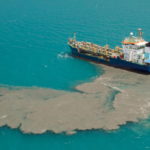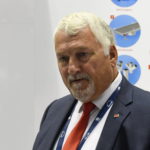It’s about magic boxes and unrealistic views: The industry for wastewater and sewage technology is looking for effective framework conditions for the market. But regulators are not (yet) reacting
It was already in March, when a group of wastewater treatment system manufacturers and environmental organisations issued a public call[ds_preview] for a revision of MARPOL Annex IV. The intention was, and still is, the verification of the ongoing performance and discharge criteria of sewage treated systems aboard ships. The argument was: While there are rules in place for verifying discharge parameters, these relate only to type-approval testing in land-based facilities. According to the industry, there is currently no enforcement of wastewater discharge criteria once a system has been installed and becomes operational aboard ship.
One of the initiators of the call was Mark Beavis, Managing Director of wastewater management system manufacturer Aco Marine. Speaking to HANSA, he confirms a rather limited response: »Up until now, we have had no direct feedback from the legislative side of the argument.« However, there were responses from various individuals/groups within the industry who are directly involved in vessel operation. According to Beavis, all have suggested that this is a situation that has to be addressed and that bringing this issue to the forefront is long overdue.
»Incapable of treating sewage«
So what is it all about? Beavis and his companions believe there are type-approved systems in operation at sea that are scientifically incapable of treating sewage waste. In his opinion, some technologies make claims that are simply not possible. »To claim that there is no sludge generated is not possible; sludge exists and there is no avoiding that fact. These technologies claim no sludge but this is only the ›apparent‹ case because they are flushing the sludge overboard as part of the operating cycle,« he says.
A paper co-authored by this group (see box) claims: »Unfortunately, conformity assessment bodies have approved their equipment. But they have certified impossibilities and created certified ›magic boxes‹. These systems contravene science.«
Beavis explains that sewage treatment plants protect the marine environment by turning raw sewage into less harmful effluent that meets specific discharge criteria set by the International Maritime Organisation. As a by-product of the treatment process sewage sludge is created that has to be either treated on board or incinerated ashore. This sludge is a by-product of all treatment processes. »But instead of being separated from the treatment process, this sludge is being flushed out in the effluent. These ›magic boxes‹ would not be able to perform no matter how well they are operated and we are very concerned about the environmental damage these systems are causing,« he argues.
The group of manufacturers presents a whole list of articles emphasising perceived weaknesses in both the definition and implementation of legislation and to better clarify the spirit of the legislation »so that it becomes an unambiguous reality,« Beavis says.
In his opinion, inspection bodies should fully understand the technology and processes being tested for approval and seek to clarify exactly how wastewater is being treated and how the by-products of the treatment process are being managed. »There should be full monitoring of the test regime throughout the testing cycle and detailed awareness of the process functionality at the time any samples are taken for testing and evaluation. It makes no sense to take process samples during, for example, the seawater flushing cycle of the system as the results are meaningless in such instances.«
While the rules were tightened with MEPC.227(64) and the use of dilution water limited during performance tests, this has not prevented the certification of these so-called sludge-free systems. »Certificates have become licenses to pollute. Something is very wrong,« the authors state in the paper. Existing Guidelines do not explicitly prohibit no-sludge systems but they believe the type approval regime is a contradiction to the IMO’s intentions, they say. »There is a lot at stake: the credibility of the approval regimes, the liabilities to shipowners and yards, a level playing field, the IMO’s environmental aspirations and ultimately, the pristine marine water that we have agreed to protect.« The authors call for IMO, its Member States and the approval assessment bodies to identify and acknowledge the issue and establish protocols in order to prevent such non-conformities from reoccurring.
Beavis does not see any dramatic technological changes in the near future, »but legislatively we hope to see treatment regulations and requirements for grey water.«


















